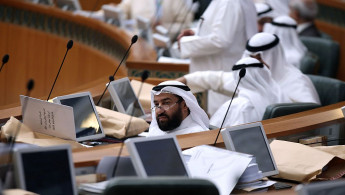Kuwait arrests former MP who criticised dissolution of parliament
Kuwaiti authorities arrested Walid Al-Tabatabai, a former member of the National Assembly, on Sunday just one day after the country’s emir announced the dissolution of the legislature and the formation of a new government.
Emir Mishal Al-Ahmad Al-Sabah also suspended parts of the Gulf country’s constitution.
Kuwaiti social media users shared Tabtabai’s last post on X (formerly Twitter) in which he accused unnamed countries of interfering in Kuwait’s internal affairs, calling this "unacceptable" and expressed hope that the National Assembly would be reinstated "with all its constitutional powers".
غير مقبول تدخل بعض الدول في الشأن الداخلي الكويتي والذي سيتم حله بطريقة التفاهم وروح الأسرة الواحدة ، وستعود الأمور بإذن الله سريعا إلى نصابها والمياه الى مجاريها وسيتم عودة سريعة لتفعيل دستور 1962 بالكامل ، وسيعود #مجلس_الامة بكامل صلاحياته الدستورية بعد قرصة الإذن وهذه…
— وليد مساعد الطبطبائي (@Altabtabie) May 11, 2024
Arab news websites reported that Tabtabai’s tweet may be referring to Saudi Arabia and the United Arab Emirates, who have supported dictatorial and counterrevolutionary movements across the Middle East since the Arab Spring.
Tabtabai is considered a conservative Islamist and has previously visited Syria to show support for Syrian rebels and refugees.
On Sunday, Kuwait’s public prosecution issued a statement saying it had ordered the arrest of one person and the detention of others, on the grounds that they had posted “expressions” on their X accounts “containing attacks on the rights and authority” of Kuwait’s emir.
Sheikh Mishal will assume some of the powers of the dissolved parliament.
The parliament had only been in existence for one month, having been elected in April 2024, with opposition MPs gaining the majority of the seats. It had not even met yet before the emir’s dissolution decree.
Kuwait has suffered political deadlock in recent years with frequent disputes between the National Assembly, which has been dissolved several times, and the government.
Eighty-three-year-old Sheikh Mishal justified his dissolution of the parliament by saying that "corruption" had increased in the country.
"The unhealthy atmosphere experienced by Kuwait in previous years has encouraged the spread of corruption to reach most state facilities, and unfortunately it reached the security and economic institutions - it has even affected the justice system," the Kuwaiti leader said.




 Follow the Middle East's top stories in English at The New Arab on Google News
Follow the Middle East's top stories in English at The New Arab on Google News


